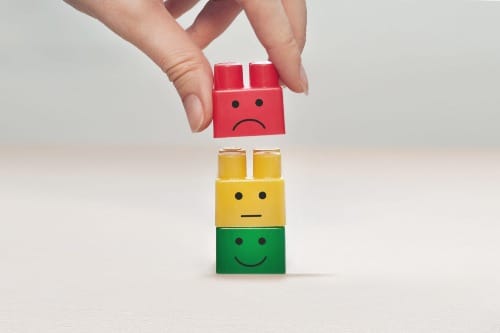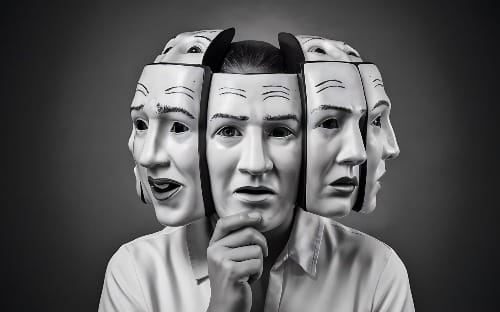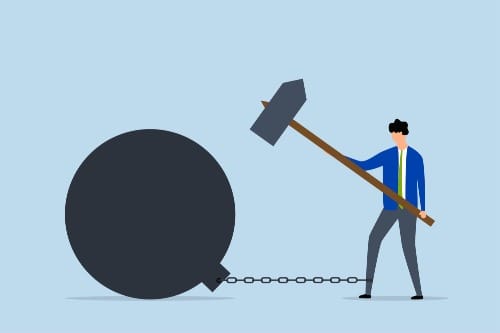Have you ever noticed how certain behaviors you engage in to avoid something unpleasant often seem to create exactly what you’re trying to prevent?
This happens when our actions are driven by negative beliefs, and instead of protecting us, they end up reinforcing the very fears we seek to avoid.
Cognitive distortions, or beliefs, are at the root of this cycle, feeding our anxiety, low self-esteem, and dissatisfaction with life.
In most psychological and wellbeing therapy approaches, beliefs are commonly explored in their hierarchical order, from the most apparent and present (intermediate beliefs), to the least obvious but more fundamental and deep-rooted ones (core beliefs).

These core beliefs can often manifest as automatic negative thoughts and cognitive distortions, which are expressions of dysfunctional assumptions rooted in early life experiences.
Understanding Negative Thoughts
Negative thoughts are a common experience for many people, and they can have a significant impact on our mental health, well-being and those around us. But what exactly are negative thoughts, and why do we have them?

What are Negative Thoughts?
Negative thoughts are those unpleasant, distressing, or unhelpful thoughts that can cloud our minds.
They often revolve around self-criticism, worry, fear, anger, and sadness. These thoughts can be about ourselves, others, or the world around us.
For instance, you might think negatively about your abilities, worry excessively about future events, or feel anger towards someone who has wronged you.
Negative thoughts can be triggered by various factors, including stress, anxiety, depression, trauma, and negative thought patterns. Recognizing these thoughts is the first step towards managing them effectively.

Why Do I Have Negative Thoughts?
Negative thoughts can stem from multiple sources, including our upbringing, past experiences, and the cultural and societal influences we are exposed to.
Often, these thoughts are a result of negative self-talk, which is the internal dialogue we have with ourselves. This self-talk can be critical, judgmental, and unkind, reinforcing negative thoughts and behaviors.
For example, if you constantly tell yourself that you are not good enough, you are likely to believe it and act accordingly. Understanding the origins of your negative thoughts and analyzing your thought process can help you address and change them, paving the way for a more positive mindset.

The Origins of Negative Beliefs
Negative beliefs often have deep roots, stemming from various sources such as past experiences, upbringing, and societal influences. These core beliefs can be so ingrained that they operate outside of our conscious awareness, subtly shaping our perceptions and behaviors in profound ways.

Historically, negative thinking may have served as a survival mechanism, helping our ancestors anticipate and prepare for potential dangers. This type of thinking allowed early humans to stay vigilant and avoid threats.
However, in the modern world, this survival technique can become maladaptive, leading to chronic stress and mental health issues.
Recognizing the origins of our negative beliefs is the first step in challenging and changing them. By understanding that these beliefs were once a form of protection, we can begin to reframe them in a way that supports our current well-being, fostering a more positive and empowered mindset.
It’s important to note that negative thoughts are often influenced by core negative beliefs, which are deeply held assumptions about ourselves, the world, and others. These beliefs can shape our reality and behaviors, but on the positive side they can also be changed through cognitive restructuring methods.
The Consequence of Negative Beliefs on Our Behavior
Self-fulfilling prophecies occur when our negative beliefs influence our actions, leading to outcomes that reinforce these beliefs.
For instance, if you believe you are unworthy of love, you might behave in ways that push others away, thereby confirming your negative belief. This cycle can be difficult to break, but it is possible.
By recognizing and challenging these core beliefs, we can disrupt this pattern and develop more positive and empowering thought processes. This shift can lead to healthier behaviors and improved mental health, allowing us to break free from the constraints of our negative beliefs.

Common Negative Beliefs
Negative beliefs can take many forms, and they often operate outside of our conscious awareness making them challenging to identify unless we are receiving feedback from others or deeply analysing our own behaviours.
Some common examples of core beliefs include:
- I am not good enough
- I am unworthy of love and respect
- I am a failure
- I am not capable of achieving my goals
- I am not deserving of happiness
These core beliefs can be deeply ingrained, influencing our thoughts, emotions, and behaviors.
By identifying and challenging these negative beliefs, we can begin to replace them with more positive and empowering thought patterns.
Taking control of your life involves recognizing these negative beliefs and actively working to change them. By doing so, you can develop greater self-confidence and a more positive outlook on life.
Remember, you have the power to change your thoughts and beliefs, and it’s never too late to start.
The following are common examples of core and intermediate beliefs along with the related mental health problems they can contribute to.

1- "I need to be successful in order to have a right to feel good about myself"
When your sense of self-worth relies heavily on accomplishments or external validation, like material success or approval from others, it may indicate deeper self-esteem struggles.
True confidence grows from within, requiring a mindset that allows you to embrace and accept yourself with compassion, no matter what is happening in your personal, academic, or professional life.
The more you tie your emotional well-being to outward factors such as physical appearance, social standing, or the influence you have on others, the more vulnerable you are to excessive worry, perfectionism, self-criticism, and low self-esteem.

2- "If I'm rejected it is because there is something wrong with me"
Personalization, or the assumption that peoples’ negative behaviours are related to you, is a common cognitive error that breeds feelings of low self-esteem and social anxiety.
Believing that rejection is a reflection of your personal flaws can lead to hypersensitivity in social interactions.
You might avoid expressing your true self or over-analyze every conversation, seeking approval at all costs. The irony here is that by focusing on preventing rejection, you become more anxious and less genuine, which can distance you from others, making rejection more likely.
A quick way to enhance your self-confidence is to question any thought that leads you to criticize yourself too quickly. For example, people's behaviors are often shaped by their own situations and emotional circumstances. Rather than immediately blaming yourself for how others respond, remember that the world is far more complex, and people’s actions are driven by factors beyond your limited viewpoint.

3- "I cannot get anything right"
This belief magnifies your mistakes and minimizes your successes.
When you think you’re bound to fail, you may not try at all or engage in self-sabotaging behaviors like procrastination.

The fear of failure can paralyze you, leading to inaction that ensures you don’t succeed—thus reinforcing your original belief that you can’t do anything right.
This is also known as magnification/minimisation – or focusing on the negative in an exaggerated fashion – which ultimately makes you feel incompetent and small, even when it does not represent the reality of things.
Such prejudiced and inaccurate core belief is at the heart of feelings of anxiety and low self-esteem.
4- "I'm not worrying, I'm just planning!"
Worrying can feel like a way to control uncertain situations. However, when worrying takes over your time and does not lead to a solution – it is also known as rumination. Believe it or not, rumination is not productive and actually exacerbates anxiety.

By obsessing over potential negative outcomes, you spend so much energy worrying that you’re unable to effectively handle the situation, often causing things to spiral out of control—creating the very outcome you feared.
The incorrect idea that worrying gives you a sense of control over reality is not only false, but it stops you from trusting yourself, getting things done and enjoying life.
5- "I should have total control over my emotions"
Suppressing emotions or striving for constant emotional control can lead to emotional burnout or unexpected outbursts.

Negative emotions are natural, and trying to avoid them only intensifies them in the long run.
The more you fight your feelings, the more out of control they become, undermining your attempts to maintain emotional stability.
People who struggle with perfectionism, anxiety, depression, or low self-esteem frequently rely on "should" statements when dwelling on their problems, as a misguided effort to regain control over their emotions and actions, though this rarely works. These rigid "should" statements reinforce negative thinking patterns, which worsen emotional suppression and negatively affect mental health.
6- "If I feel insecure and inadequate about trying something new, it is because I know it won’t work"
Emotional reasoning—believing that how you feel predicts the outcome—leads to avoidance of new opportunities and challenges.
When you feel anxious or insecure, you may avoid taking risks, which only limits your growth. Avoiding action due to fear of failure reinforces the belief that trying new things is dangerous, leading to stagnation and missed opportunities.

7- "If people knew the real me, they wouldn't like me"
Fearing rejection for your authentic self may lead you to present a false version of who you are, constantly trying to meet others’ expectations.

However, this incongruence between your true self and your outward behavior creates an inner tension and a sense of isolation. You may feel like no one truly knows you, thus reinforcing the belief that your real self is unworthy of love or acceptance, ultimately leading to feelings of self-doubt, anxiety, frustration and a depressive outlook towards life.
Breaking the Cycle of Negative Beliefs
To break free from the trap of negative beliefs driving counterproductive behaviors, you must first recognize and challenge these beliefs.

Here's how you can start:
- Identify the belief: When you notice a negative emotion or behavior, pause and ask yourself, “What belief is driving this?”
- Challenge the belief: Question whether the belief is rooted in reality. Is it an all-or-nothing statement like, “I must be perfect to be accepted”? What evidence do you have to support or refute this thought?
- Restructure the belief: Replace the rigid, negative belief with a more flexible and compassionate one. For example, instead of thinking, “I must succeed to feel good about myself,” try, “I can feel good about myself regardless of my achievements.”
- Practice self-compassion: Understand that it’s okay to experience negative emotions or make mistakes. Cultivating a kind and non-judgmental attitude toward yourself can gradually weaken the grip of negative beliefs.
Take Charge of Your Thoughts to Transform Your Life's Path
Negative beliefs don’t have to dictate your life. While they may have developed as coping mechanisms, they often do more harm than good by reinforcing the very outcomes they seek to avoid.
By examining and challenging beliefs that are too rigid, you can free yourself from their self-sabotaging effect and create a healthier, more flexible mindset—one that encourages growth, resilience, and genuine well-being.





